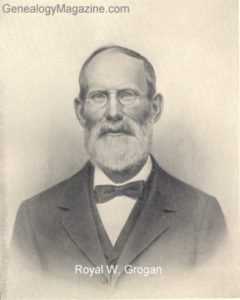 ROYAL WESLEY GROGAN. The subject of this biographical review holds the distinction of being the oldest surviving settler of the Red River portion of Clay county. He identified himself with it when it was hazardous for a white man to establish his residence so near the murderous and thieving Comanche as his location brought him, but he came to this new country to settle and help in its development, and no to make reprisals of the red man, and his operations here and the conduct of his business were not seriously interfered with.
ROYAL WESLEY GROGAN. The subject of this biographical review holds the distinction of being the oldest surviving settler of the Red River portion of Clay county. He identified himself with it when it was hazardous for a white man to establish his residence so near the murderous and thieving Comanche as his location brought him, but he came to this new country to settle and help in its development, and no to make reprisals of the red man, and his operations here and the conduct of his business were not seriously interfered with.
In the spring of 1874 a few new settlers drifted into Clay county form eastern points and selected locations upon the bleak and unbroken stretches of prairie, the home of the prairie dog, the coyote and the cowboy. They came with peaceable intentions and quietly went about their vocations, as tamers of the frontier, winning the confidence and high regard of their isolated neighbors and making for themselves and their posterity a name and a local fame as enduring as the sand of the sea. Among these settlers was the gentleman named in the introduction of this article. He was a settler from Kanawha county, West Virginia, and introduced into the Lone Star state the youth, the vigor and the pure blood of one of the best families of North Carolina, for it was in Rockingham county, that state, that its early American history was made.
Royal W. Grogan was born December 8, 1828, in Rockingham county, North Carolina, and his parents were Robert and Serena (Harris) Grogan, native to the same county and state as our subject, and of Irish ancestry. The father was born about the year 1800, was a carpenter and died at the age of fifty-six years, while his wife died at about fifty years of age. Of their family of eleven children Royal W. is the third. He was schooled in the rural district schools and his education was up to the average of his day and time. He began life independently as tobacco manufacturer in his native state and after a year went into West Virginia, Kanawha county, and engaged in the manufacture of salt at Malden. He conducted the business with success till the emancipation of the Negro deprived him of his help, when the business fell into sudden decline. From this event until his advent to Texas, a period of some dozen years, no business connection engaged him and the stocking of his little ranch and the grazing of his herd were the acts which again brought him into full fellowship with the business world.
The first decade of his experience on the range was attended with little effort beyond that required in applying the brand and counting the herd. Stock roamed the unlimited and boundless grassy sward without molestation until the season of “rounding up” when each owner scoured the plains for and gathered unto himself his own. Mr. Grogan was one of the small growers of the county and has continued so, having a ranch of four hundred and eighty acres.
Mr. Grogan was married in Kanawha county, West Virginia, in 1859, to Miss Fannie Summerfield, a daughter of Samuel Summerfield. Mrs. Grogan died February 2, 1898, being the mother of Robert P., one of the leading young ranchmen of Clay county; Edward W., also a prominent ranch and stockman and farmer, near Byers, and widely known as a successful business man of Clay county; Serena, Helen, John, Ida, Jesse and Moses.
In his relation to his county Mr. Grogan has been a plain, unassuming gentleman. His business obligations have always been met and his methods have stood the scrutinizing eye of nearly a third of a century without suspicion of evil. His social nature has brought him into contact with all his neighbors and his universal popularity is the result. His family have taken honorable places in the busy world and he manifests a pardonable pride in their success.
Source: B. B. Paddock, History and Biographical Record of North and West Texas (Chicago: Lewis Publishing Co., 1906), Vol. II, pp. 406-407.
